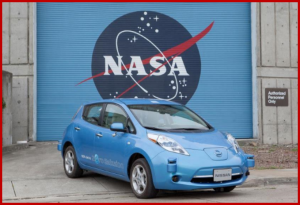Nissan’s North American-based subsidiary and NASA today announced the formation of a five-year research and development partnership to advance autonomous drive systems and prepare for commercial application of the technology.
NASA did not press release the deal, leaving it to the French- and Japanese-owned Nissan to boast about the research in an attempt to downplay what is sure to be controversial – U.S. taxpayer resources supporting – yet again – offshore corporations.
Nissan said researchers from Nissan’s U.S. Silicon Valley Research Center and NASA’s Ames Research Center at Moffett Field, CA will focus on autonomous drive systems, human-machine interfaces, network-enabled applications, and software analysis and verification, all involving hardware and software used in road and space applications.
Yes, we are apparently turning over part of our ongoing space program to the French and Japanese.
Researchers from the two organizations will test a fleet of so-called zero-emission autonomous vehicles at Ames to demonstrate proof-of-concept remote operation of autonomous vehicles for the transport of materials, goods, payloads and people.
Nissan said that for NASA, these tests parallel the way it operates planetary rovers from a mission control center. The first vehicle of that fleet should be testing at the facility by the end of 2015.
“The work of NASA and Nissan – with one directed to space and the other directed to earth, is connected by similar challenges,” said Carlos Ghosn, president and CEO of Nissan Motor. “The partnership will accelerate Nissan’s development of safe, secure and reliable autonomous drive technology that we will progressively introduce to consumers beginning in 2016 up to 2020.”
Nissan has set 2020 as the time frame for the introduction of autonomous drive vehicles that have the ability to navigate in nearly all situations, including the most complex situation, city driving.
According to the terms of the partnership, Nissan claimed that NASA would benefit from Nissan’s shared expertise in innovative component technologies for autonomous vehicles, shared research to inform development of vehicular transport applications, and access to appropriate prototype systems and provision of test beds for robotic software.
“All of our potential topics of research collaboration with Nissan are areas in which Ames has strongly contributed to major NASA programs,” said director of Ames Research Center, S. Pete Worden.


